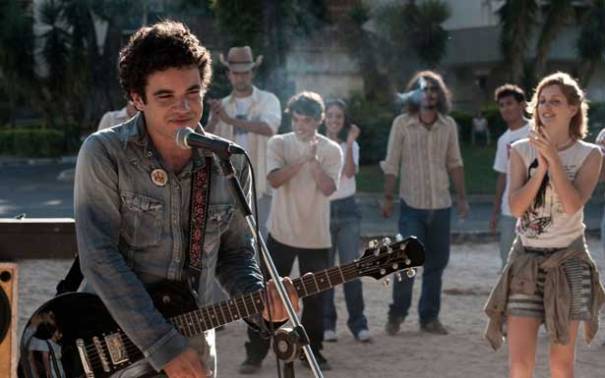I finally watched Somos tão jovens, a fictional recreation –as if all recreations were not somehow fictional- of Brazilian rock band from the 80s Legião Urbana. The same way we now experience art in a fragmented way because time is now full of distractions and social commitments, as the new technologies never fail to remind us attacking weak and inconstant minds like mine, I started the movie at Guarulhos airport a few months ago. The music that made pular a whole generation and still remains in the imaginary of a youth eager for a Brazilian movida, kept me occupied in the tedious hours of a flight connection. Sometimes we prefer not to go back to those half-seen films until much later when we find ourselves in a better mood to immerse into them, or we keep on seeing pieces, sequences that stay for a while in our change-addicted brains until we decide to check emails, facebook accounts, different hypertexts…, or until the final call for your flight home makes it through your ears.
Young Renato Russo, the real theme of the story, is depicted here as he probably was, a tormented soul living in a conservative society in search of a new crisis that helped him learn who he was and who he wanted to become; it’s like a Lou Reed’s clone –the physical similarities are obvious- without the life and experiences of the New Yorker but with as much genius –by Brazilian standards- as his. The film is not a hagiography of a dead myth; on the contrary, it focuses on the contradictions of an egocentric personality whose not completely self-assumed homosexuality initially causes him great psychological distress. The fiction tries to referentially explain the well-known lyrics with events from his life. As 21st century individuals, we cannot but see the rebellious evolution of that upper-middle Brazilian youth as a pose generating fashion victims, as a more mature and not-punk-any-more Renato throws to his audience when he calls them spoiled brats. It’s the final years of the dictatorship, but their claim for democracy is not a real one, only the imitation of an Anglo-Saxon music style and a naïve rebelliousness; exactly the opposite of the present complains by young lower and “middle” classes than can be seen on the streets in the main Brazilian cities during the World Cup demanding better living conditions and decent public services in the most racially “harmonious” country in the world, as a friend of mine wrongly told me recently.










